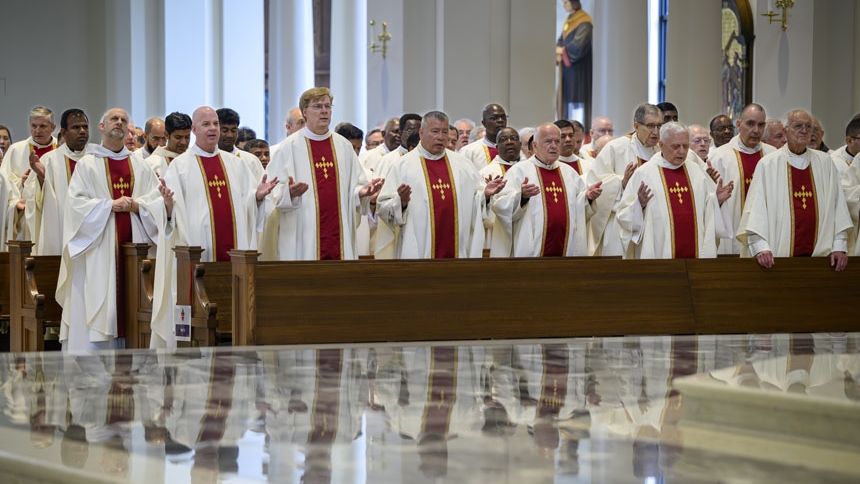
The Catholic Project at The Catholic University of America has released its 2025 National Study of Catholic Priests, offering a comprehensive look at the well-being, priorities, and perspectives of U.S. Catholic priests.
Building on the landmark 2022 study—the largest of its kind in over 50 years—the 2025 report finds that over 80% of priests are flourishing, scoring an average of 8.2 out of 10 on the Harvard Flourishing Scale, a widely recognized measure of personal well-being. The study also reveals a slight uptick in confidence in bishops since 2022, alongside notable generational divides in political leanings, views on the Synod on Synodality, and pastoral priorities.
Key findings: Well-being and trust
The 2025 study confirms that the majority of U.S. priests report high levels of personal well-being, reflecting resilience in their demanding roles. However, the data also highlights challenges, with 5% of priests experiencing high levels of emotional exhaustion, and a significant portion showing some burnout symptoms. Confidence in bishops has improved slightly since 2022, but trust remains lower among priests who perceive a lack of personal care from their bishops, pointing to ongoing tensions in ecclesiastical leadership dynamics.
Pastoral priorities
Priests identified ministering to young people, married couples, and families as their top priority, underscoring a commitment to nurturing the next generation of Catholics. Evangelization ranked as the second-highest priority, followed by concerns such as poverty, pro-life issues, and immigration. These priorities reflect the Church’s mission to engage both spiritually and socially with contemporary challenges.
Generational divides
The study reveals stark generational differences among priests, particularly between those ordained after 2010 and their older counterparts. Younger priests are more likely to identify as politically conservative, contrasting with the more liberal leanings of older priests. This divide extends to ecclesial matters: younger priests express less enthusiasm for the Synod on Synodality—a global Church initiative focused on collaborative governance—compared to older priests, who are more supportive. Additionally, younger priests place greater emphasis on Eucharistic devotion, while older priests show stronger support for outreach to the LGBTQ community.
Background and methodology
The 2025 study builds on the 2022 National Study of Catholic Priests, which surveyed 10,000 priests, conducted a census of 131 bishops, and included in-depth interviews with over 100 priests. The 2025 report incorporates follow-up surveys with the original respondents, providing a longitudinal perspective on trends within the priesthood. This rigorous methodology ensures the study’s findings offer a robust snapshot of the state of the U.S. Catholic priesthood today.
Implications
The findings of the 2025 study highlight both the vitality and the challenges within the U.S. Catholic priesthood. The high well-being scores suggest a resilient and committed clergy, yet the generational divides point to potential shifts in the Church’s future direction. As younger, more conservative priests rise in influence, their focus on traditional practices like Eucharistic devotion may shape pastoral approaches, while differing views on synodality and social outreach could influence the Church’s engagement with modern issues.
For more details, the full 2025 National Study of Catholic Priests is available through The Catholic Project at The Catholic University of America.

